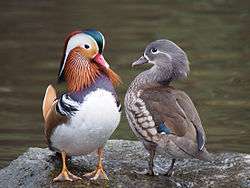Definify.com
Definition 2026
鴛鴦
鴛鴦
Chinese
| male mandarin duck | female mandarin duck | ||
|---|---|---|---|
| trad. (鴛鴦) | 鴛 | 鴦 | |
| simp. (鸳鸯) | 鸳 | 鸯 | |
Noun
鴛鴦
- mandarin duck
- (figuratively) affectionate couple; happily married couple
- (figuratively) objects which occur in inseparable pairs
- yuanyang (a beverage made from mixing coffee with Hong Kong-style milk tea)
-

鴛鴦 (mandarin ducks)
-

鴛鴦 (beverage)
Derived terms
Descendants
Japanese

Etymology 1
| Kanji in this term | |
|---|---|
| 鴛 | 鴦 |
| Hyōgaiji | Hyōgaiji |
| Irregular | |
From 愛し (oshi, “dear, loving”), from the way the ducks are believed to mate for life and seldom stray far from one another.
The spelling is from Chinese, with 鴛 representing the male bird and 鴦 representing the female bird.
Pronunciation
Noun
鴛鴦 (hiragana おし, romaji oshi, historical hiragana をし)
- a mandarin duck, Aix galericulata
- a kind of 家紋 (kamon, “family crest”) featuring a mandarin duck
Etymology 2
| Kanji in this term | |
|---|---|
| 鴛 | 鴦 |
| Hyōgaiji | Hyōgaiji |
| Irregular | |
Originally a compound of 愛し (oshi, “lovely”) + 鳥 (tori, “bird”), from the way the ducks are believed to mate for life and seldom stray far from one another. The tori changes to dori as an instance of rendaku (連濁).
The spelling is from Chinese, with 鴛 representing the male bird and 鴦 representing the female bird.
Pronunciation
Noun
鴛鴦 (hiragana おしどり, katakana オシドリ, romaji oshidori, historical hiragana をしどり)
- a mandarin duck, Aix galericulata
- (figuratively) a pair of lovebirds: a loving couple
- a topknot or bun hairstyle wherein the hair is bunched on each side in a shape vaguely resembling two mandarin ducks
Derived terms
Usage notes
As with many terms that name organisms, this term is often spelled in katakana in biological contexts, as オシドリ.
Etymology 3
| Kanji in this term | |
|---|---|
| 鴛 | 鴦 |
|
えん Hyōgaiji |
おう Hyōgaiji |
| on'yomi | |
/weɴau/ → /weɴɔː/ → /eɴoː/
Pronunciation
Noun
鴛鴦 (hiragana えんおう, romaji en'ō, historical hiragana ゑんあう)
- a mandarin duck, Aix galericulata
- (figuratively) a pair of lovebirds: a loving couple
Usage notes
The en'ō reading appears to be less common than oshidori above.
References
- 1 2 3 2006, 大辞林 (Daijirin), Third Edition (in Japanese), Tōkyō: Sanseidō, ISBN 4-385-13905-9
- ↑ 1998, NHK日本語発音アクセント辞典 (NHK Japanese Pronunciation Accent Dictionary) (in Japanese), Tōkyō: NHK, ISBN 978-4-14-011112-3
- 1 2 1997, 新明解国語辞典 (Shin Meikai Kokugo Jiten), Fifth Edition (in Japanese), Tōkyō: Sanseidō, ISBN 4-385-13143-0